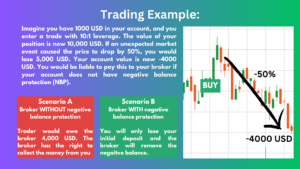Forex trading is risky, and big price movements sometimes happen fast. If traders are on the right side of that movement, it can mean significant profit-taking in a short period of time. However, rapid market fluctuations can also deliver enormous capital losses. Without any safeguards in place, these losses could leave traders with a negative balance in their accounts, owing their broker money beyond their initial deposit.
This high degree of risk makes it dangerous for traders to enter the Forex market. In the last decade, many brokers have begun to put a safeguard in place to prevent these losses called negative balance protection.
What is Negative Balance Protection?
Negative balance protection (NBP) is a risk management tool put in place by brokers to ensure that a trader’s account never goes below zero. In other words, traders cannot lose more money than they have deposited into their trading account.

NBP is particularly important for new traders who may be unfamiliar with how rapidly markets can move, especially at the opening and closing of the trading day or on the back of unexpected news.
NBP also allows new traders to try different trading strategies with the knowledge that they won’t go into debt with their broker. At the same time, taking advantage of NBP does not limit any potential gains that could be made.
Not all brokers guarantee NBP
Brokers in some, but not all, jurisdictions are required to provide NBP. While providers of leveraged products in the UK, the EU, and Australia must, by law, provide NBP, brokers in South Africa and the rest of the world are not subject to the same requirement.
Additionally, while brokers in South Africa and other jurisdictions may say they offer negative balance protection, it may not be automatic. In other words, you may have to request it from your broker. So, before selecting a broker, you should perform careful research to ensure that the policies and services they offer suit your trading needs. Remember that if you opt for a brokerage that does not offer negative balance protection, you expose yourself to unnecessary financial risk.
Arbitrage
In some cases, brokers in South Africa don’t offer negative balance protection because they have been the victims of arbitrage. Arbitrage trading involves the simultaneous buying and selling of the same Forex pair to exploit pricing inefficiencies between two brokers. A trader often opens accounts at two different brokers, takes advantage of the price differences, and uses negative balance protection to ensure they don’t lose more than their deposit. If a broker suspects that a trader is arbitrage trading and exploiting negative balance protection, the broker may revoke the negative balance protection.
Some brokers also seek to entice new customers to open accounts by offering NBP for an introductory period only. When researching brokers, you should ensure the broker you are considering offers unlimited negative balance protection because once the grace period expires, you will be liable for any negative balances carried by your account.
Regulation and NBP
Top-tier regulators such as the UK’s Financial Conduct Authority, the Cyprus Securities and Exchange Commission (CySEC), and the Australian Securities and Investment Commission (ASIC) mandate that all brokers offer traders automatic negative balance protection.
However, the regulatory regime in terms of NBP varies across lower-tier or weaker regulators. The Securities Commission of The Bahamas announced in 2020, amid a general tightening of the regulatory regime, that brokers registered in its jurisdiction would be required to offer NBP to clients. However, regulators such as the Financial Services Commission of Mauritius, the Financial Services Authority of Seychelles, and the International Financial Services Commission of Belize do not require brokers to offer NBP.
When researching brokers, traders should opt for those that are regulated by top-tier authorities, even if they are not onboarded through those entities, because it is more likely that the broker will offer NBP.
Conclusion
When choosing a Forex broker, always find out what safeguards they have in place to protect you from capital losses. Not all brokers offer traders NBP, which means that traders could end up owing their brokers large sums of money.
In general, Forex brokers that offer automatic NBP are regarded as more trustworthy because they are not trying to profit from your debt.


























